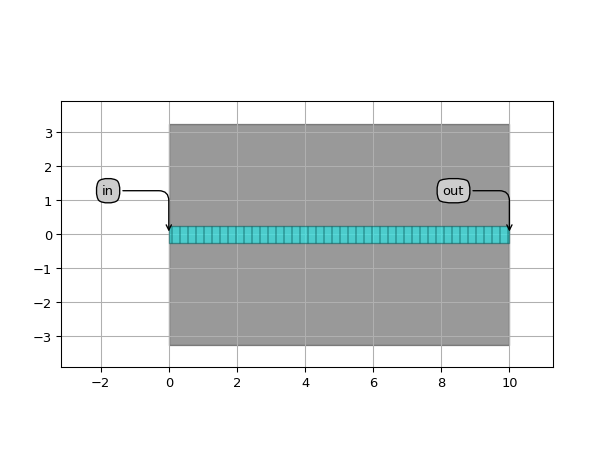SocketWaveguideTemplate
- class picazzo3.traces.socket_wg.SocketWaveguideTemplate
Socket-style waveguide template: deep etched rib waveguide
___________ | | _______________| |________________ ____________________________________________
- Parameters:
- name: String that contains only ISO/IEC 8859-1 (extended ASCII py3) or pure ASCII (py2) characters
The unique name of the pcell
Views
- class Layout
- Parameters:
- cladding_width: float and number > 0
total width of the waveguide with cladding
- cladding_purpose: PatternPurpose
drawing purpose layer for the cladding
- cladding_process: ProcessLayer
process for the waveguide cladding, defaults to the core process
- core_purpose: PatternPurpose
drawing purpose for the waveguide core
- core_process: ProcessLayer
process for the rib
- windows: List with type restriction, allowed types: <class ‘ipkiss3.pcell.trace.window.window._TraceWindow’>
List of Trace Windows that know how to draw themselves relative to the shape of the Trace
- core_width: float and number > 0
width of the rib
- core_layer: __Layer__
layer used to define the core of the waveguide
- pin_shape: Shape
shape to be used for the pins
- trace_template_for_ports: _TraceTemplate.Layout
Trace template to be used for the ports. Default = this template
- width: float and int, float, integer, floating and number >= 0
- control_shape_layer: __Layer__
layer on which the control shape is drawn
- draw_control_shape:
draws the control shape on top of the waveguide
- cover_layers: List with type restriction, allowed types: <class ‘ipkiss.primitives.layer.Layer’>
layers that can be used to generate additional coverage of the trace (e.g. manhattan corners)
- view_name: String that contains only alphanumeric characters from the ASCII set or contains _$. ASCII set is extended on PY3.
The name of the view
Examples
"""This example shows how you use the template to directly create a socket waveguide PCell and its layout.""" import si_fab.all as pdk # noqa: F401 from picazzo3.traces.socket_wg.trace import SocketWaveguideTemplate wg_t = SocketWaveguideTemplate(name="my_socket_wg_template1") wg_t.Layout(core_width=0.5, cladding_width=2 * 3.0 + 0.5) wg = wg_t(name="my_socket_waveguide1") layout = wg.Layout(shape=[(0.0, 0.0), (10.0, 0.0)]) layout.visualize(annotate=True)
